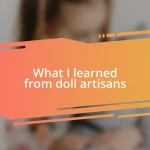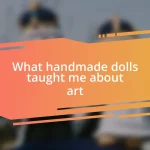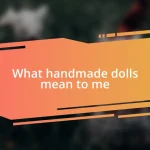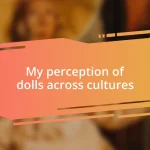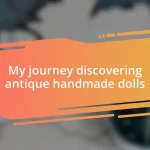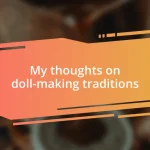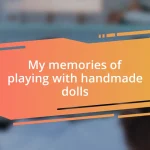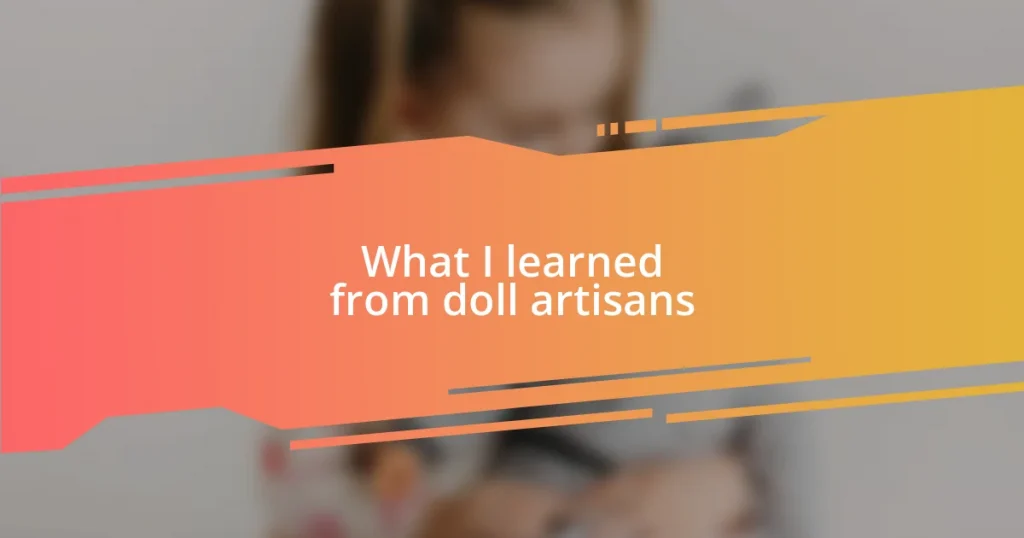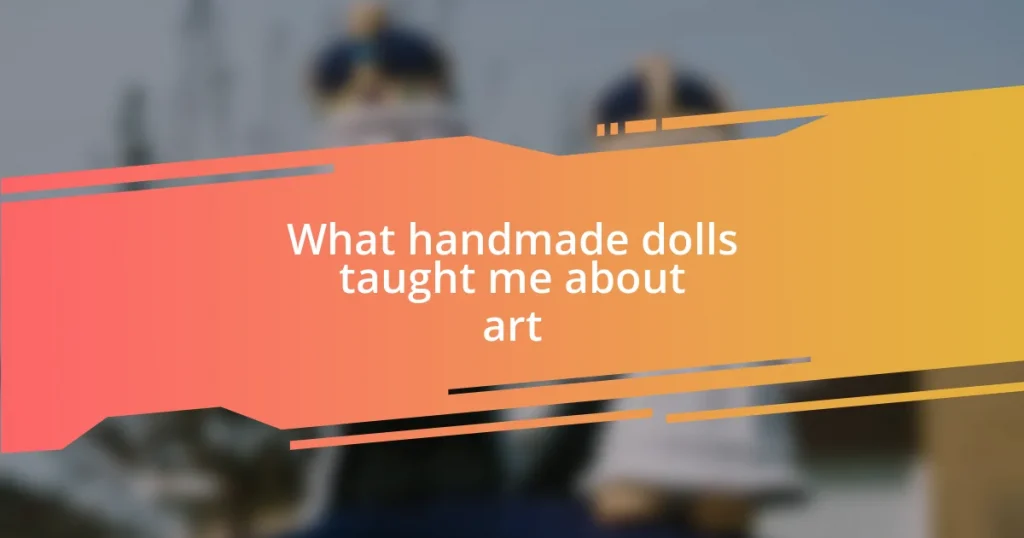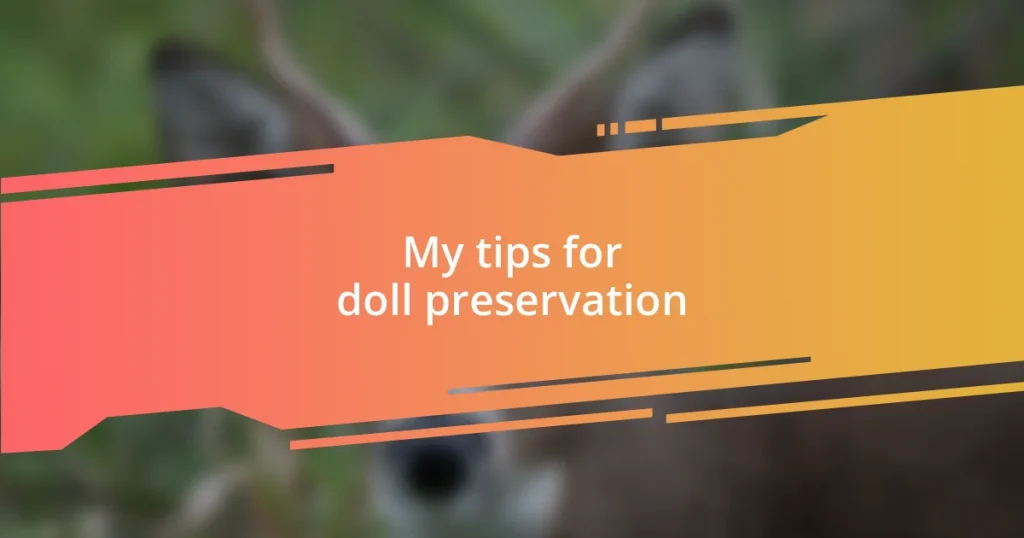Key takeaways:
- Custom dolls promote individuality, creativity, and emotional connections, serving as tools for self-expression and storytelling.
- The personalization of dolls fosters creativity, decision-making skills, and encourages social interaction among children through collaborative play.
- Custom dolls can be leveraged in therapeutic and educational settings, aiding emotional expression and enhancing literacy skills through interactive storytelling.

Understanding Custom Dolls Importance
Custom dolls hold significant importance as they go beyond mere toys; they represent individuality and creativity. I remember the joy on my niece’s face when she received a custom doll that looked just like her. It was as if she saw herself mirrored in that little figure, fostering self-esteem and validation.
These dolls can also serve as powerful tools for storytelling. Think about it: each doll can tell a story that resonates with the interests and experiences of its owner. I once crafted a custom doll that reflected my childhood adventures, from exploring the woods to my fascination with space. It sparked conversations about my past and allowed a deeper connection with those around me.
In a world that often pushes conformity, custom dolls empower children to embrace their uniqueness. They encourage creative expression and allow kids to envision a world where they can be anything they dream of. Have you ever seen how a simple doll can inspire a child’s imagination? It’s magical to witness the worlds they create around these personalized figures.

Exploring Benefits for Personalization
Custom dolls offer a remarkable opportunity for personalization, allowing children and collectors alike to reflect their individuality. For example, I remember customizing a doll for a friend’s birthday. She loved cats, so we designed the doll with a cute feline outfit and even added a tiny cat accessory. The look of delight on her face was priceless—it showed me how much a personalized touch can mean.
Beyond aesthetics, the personalization of dolls supports emotional connections. When I created a doll that embodied a cherished family member, it became a comforting presence for my child during tough times. It was heartwarming to see how the doll served not just as a toy but as a reminder of love and connection, providing solace in moments of uncertainty.
Another significant benefit of personalization is the encouragement of creativity. Children aren’t just playing; they’re engaging in the art of creation, choosing outfits, hairstyles, and accessories that resonate with their personality. I find this creative process fascinating, as it promotes decision-making skills and boosts confidence. Have you ever witnessed a child’s face light up while picking out their doll’s features? It’s a beautiful blend of joy and empowerment.
| Benefit | Description |
|---|---|
| Emotional Connection | Custom dolls can represent loved ones, offering comfort and security. |
| Creativity | Personalization encourages imaginative play and decision-making skills. |

Enhancing Creativity and Imagination
Custom dolls serve as a canvas for creativity, igniting the imagination in ways we often overlook. I recall a weekend crafting session with my daughter where we designed a doll inspired by her favorite book character. As we stitched and styled, I could see her mind racing with possibilities—she wasn’t just creating a doll; she was crafting a whole narrative. This experience reminded me that every stitch can unleash storytelling potential, transforming a simple activity into an imaginative adventure.
- Role-Playing Opportunities: Custom dolls encourage children to play different characters, enriching their understanding of storytelling.
- Visual Arts Development: Designing dolls enhances artistic skills as children choose colors, patterns, and accessories that express their personal style.
- Problem-Solving Skills: When kids design their dolls, they navigate challenges, such as how to represent their ideas visually, promoting critical thinking.
Through these playful interactions, I’ve noticed that kids often merge their everyday experiences with fantasy, creating worlds where anything is possible. Watching my daughter create her own narratives with her custom doll reaffirms my belief that fostering imagination starts with simple, personal touches.

Fostering Emotional Connections
Creating custom dolls has an incredible ability to foster deep emotional connections. I remember when my nephew was feeling lonely after moving to a new city. Together, we designed a doll that looked just like him. It was amazing to see how he hugged it tightly, as if it was a friend reminding him he wasn’t alone. This experience made me realize just how a doll can become a vessel of companionship in times of change.
There’s something profoundly soothing about having a custom doll that mirrors loved ones. When I crafted a doll featuring my grandmother’s likeness, my daughter clutched it during storytime, as if she were connecting with her great-grandmother’s spirit. The warmth that emanated from that moment was palpable; it illustrated how these personalized dolls can bridge generations and offer emotional reassurance.
Have you ever noticed how certain objects carry stories? For my kids, their custom dolls aren’t merely toys; they are living memories. I see them telling their friends about the stories behind each doll—who they represent and the adventures they’ve shared. This storytelling not only nurtures emotional bonds but also inspires empathy and understanding. Each doll acts as a conversation starter, leading to meaningful interactions and lasting memories.

Encouraging Social Interaction Skills
Custom dolls can be an incredible tool for nurturing social interaction skills among children. I remember once organizing a small gathering where kids brought their custom dolls to play together. As they engaged in role-playing games, I was amazed to see how they started to negotiate roles and share ideas. It warmed my heart to witness them communicating and collaborating, demonstrating that these dolls were not just playthings, but bridges to social connection.
In another instance, I observed my daughter teaching a friend how to create a doll based on their favorite movie character. It was fascinating to watch them discuss design choices, encouraging each other’s creativity. Through this collaboration, they practiced essential communication skills, learning to articulate their thoughts while being receptive to feedback. Have you ever thought about how such playful exchanges can be the seeds of lifelong friendships?
Moreover, I’ve seen firsthand that the stories behind each custom doll often become shared narratives among children. One afternoon, my kids and their friends created a fantasy world inhabited by their dolls. The excitement was contagious as they took turns leading the adventure, negotiating plots and character traits. This kind of imaginative play nurtures not just creativity but also valuable social skills, like teamwork and empathy, as they learn to appreciate different perspectives while having fun.

Promoting Cultural Awareness in Play
Creating custom dolls can truly enhance cultural awareness in children’s play. I clearly remember the day my daughter and I crafted a doll inspired by a friend’s cultural background—its beautiful attire reflected traditions I wasn’t fully familiar with. Watching her interact with it, asking questions like, “Mom, what do these colors mean?” sparked a wonderful conversation about diversity and the stories behind different cultures. In that moment, I realized how a simple doll could open a window into understanding and appreciation of others.
One afternoon, I hosted a doll-making workshop where children could create dolls from various cultural backgrounds. Seeing the excitement in their eyes when they learned about their dolls’ origins was magical. It was enlightening when one child said, “I didn’t know people celebrated that!” This kind of engagement not only promotes curiosity but also encourages children to embrace differences in their play, fostering a sense of belonging and connection with the wider world.
Have you ever stopped to think about how play can be a springboard for cultural education? My son created a doll wearing a traditional outfit from a culture we recently studied in school. As he played, he spoke proudly of the rituals associated with that culture, sharing insights with his friends. It struck me how effortless it becomes to weave valuable cultural lessons into play when we use creative tools like custom dolls, enhancing their learning experience in a fun, memorable way.

Applications in Therapy and Education

Applications in Therapy and Education
Custom dolls can serve as powerful tools in therapeutic settings, particularly for children navigating emotional or psychological challenges. I once watched a therapist use a custom doll in a session with a shy child. The doll allowed the child to express feelings that were otherwise difficult to articulate. It was heartwarming to see how the simple act of giving the doll a voice helped the child open up. Have you ever noticed how a figure in play can offer a safe space for vulnerability?
In educational contexts, these dolls also become catalysts for storytelling and literacy skills. I recently joined a classroom project where kids created dolls based on characters from books they were reading. The excitement in the room was palpable as they discussed their characters, and the creative process literally brought the stories to life. It made me realize that when children are engaged, their learning is often stronger. I wonder, how much more effective can education be when it intertwines creativity with curriculum?
Moreover, the use of custom dolls can aid in peace negotiations among children or as an intervention during conflict. I remember a moment when two kids couldn’t agree on a game. They started playing with their custom dolls instead, creating a story that combined both of their ideas. Watching them work through their disagreements and build on each other’s thoughts gave me hope that these dolls can foster conflict resolution skills naturally. Isn’t it fascinating how a simple creation can lead to deeper understanding and cohesion among peers?
